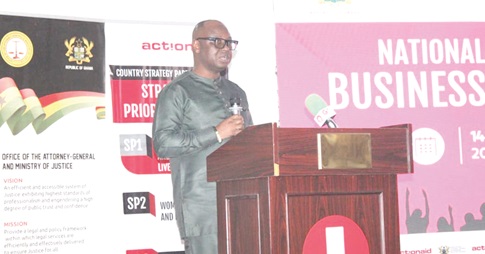
UN member states urged to advocate protection of women’s rights
United Nations (UN) member states signed onto a draft Legally Binding Treaty on Business and Human Rights have been urged to advocate for amendments in the document to strengthen protection for human rights, particularly women's rights in the business environment in the country and across the globe.
The measure would also ensure that the rights of marginalised communities and vulnerable populations, especially women and children, were guaranteed to prevent them from becoming victims of forced evictions, environmental degradation, labour exploitation and land-grabbing tendencies which are becoming common in recent times.
The Country Director of ActionAid Ghana, John Nkaw, made the call at the opening of a three-day National Stakeholder Forum on the UN Legally Binding Treaty on Business and Human Rights in Accra last Tuesday.
Forum
The forum was aimed at soliciting the views of key stakeholders drawn from the banks, the Attorney-General and Ministry of Justice, the Ministry of Employment and Labour Relations, the Commission on Human Rights and Administrative Justice (CHRAJ), the petroleum industry and Civil Society Organisations (CSOs).
It was organised by ActionAid, Ghana, in collaboration with the Office of the Attorney-General and Ministry of Justice. The UN Human Rights Council in June 2011 unanimously endorsed the guiding principles on Business and Human Rights (UNGPS) in its resolution 17/4, which was supported by governments from all regions of the world to advance the protection, respect and redress of human rights violations by businesses.
“For ActionAid, the need for a legally binding treaty on business and human rights is not merely a matter of policy but a moral imperative. Too often, we have witnessed first-hand, the devastating impact of corporate activities on the lives and livelihoods of those least able to defend themselves,” Mr Nkaw stated.
He called on financial institutions to invest more in agroecology to save the environment and mitigate the effects of climate change rather than fossil fuel explorations by transnational corporations.
“As stakeholders, we must seize this opportunity to scrutinise the proposed language, and identify potential gaps or loopholes in the document,” Mr Nkaw advised the stakeholders.
CHRAJ proposal
The Commissioner of Human Rights and Administrative Justice (CHRAJ), Joseph Whittal, suggested “A strong move to develop a legally binding treaty on business and human rights.”
He said, “This is a good move which we strongly support because we believe that a binding treaty would challenge all state parties to do everything possible to protect businesses and human rights as well as ensure compliance by businesses as a binding treaty comes with reporting obligations and possible sanctions for non-compliance.”
Mr Whittal identified issues of global warming, cyber security threats, conflicts, and corruption and the challenges and complexities of navigating those issues made it imperative for a legally binding treaty on business and human rights to be put in place.
Other speakers at the function included the Deputy Attorney-General and Minister of Justice, Alfred Tuah and the Solicitor-General, Office of the Attorney-General and Ministry of Justice, Helene Akpene Awo Ziwu.
